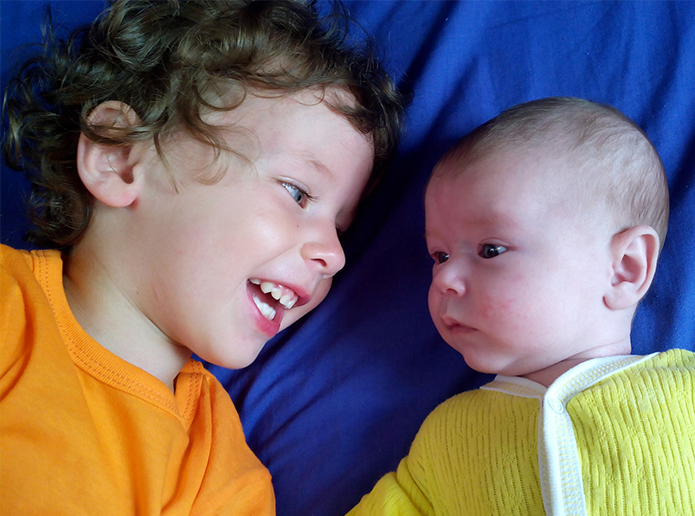Pregnancy and the birth of a new baby can stir up many different feelings for parents and other family members.
It may bring up thoughts about what their new baby will be like, how their baby will make them feel, and whether they will love this baby as much as their first.
There may be great excitement, or feelings of lack of control. These expectations regarding the new baby are sometimes related to past experiences, especially if the first child proved difficult to settle.
Confidence comes with experience, and many second and third time parents find being a parent again easier. They feel more confident, relaxed and less stressed in general. They feel more secure in the choices they make and things that seemed so difficult with the first child seem like second nature.
Siblings will be one of the most important relationships in your child’s life. This will be a longer relationship than the parent-child relationship so it is important that it has a good start.
Dynamics within the household
When a new baby comes along, it’s common for roles within the family to change.
Often a new baby means the workload can double so it may be helpful to discuss each person’s roles and make changes before the baby arrives, making sure the transition is smooth. Discuss who will be doing what.
Combining jobs can help when time is short. Cooking dinner with the sibling means that dinner is made and quality time has been spent with the older child. Walking with the baby in the pram provides an opportunity for exercise and time with baby.
If the new baby is breastfed, mum may like to spend some separate one on one time with the toddler and so may want their partner or other family members to take the baby rather than the older child. Offering individual attention to the older child reduces jealousy and their need to compete.
Stepfamilies
For stepfamilies, the arrival of a new baby can bring about a surprising range of emotions for both adults and existing children. The strong need to protect and nurture their baby can take a first time parent (and step-parent) by surprise. This can be because it highlights less intense feelings they may have for their stepchildren.
For an only child in particular, the new baby’s arrival may lead to feelings of jealousy and loneliness. In contrast, it can be easier when a step-parent becomes a biological parent, and they become an integral part of the stepfamily.
Planning before the baby arrives
- Try to plan as much as possible for the arrival of a new baby.
- Consider simple things like having meals in the freezer, booking online food shopping and having plenty of nappies.
- What family support do you have? Who can you call on? Make a list and contact them to check they are ready to help out.
- If family and friends can help, consider compiling a list of tasks or chores that need to be done and put them on the fridge to be seen.
- Look for local support services in your community. Outside support may include nappy services, adopt a nanny, cleaners etc.
- Who will take care of your toddler if labour is early? Make a list of different options and discuss them with your partner so you are both prepared.
For FIFO families
Find out where the nearest support group is and write down the dates they meet. Look at work rosters or contracts to see if the worker can get extended leave or parental leave to spend time with the new baby and toddler.
From the toddler’s point of view
We expect toddlers to adjust instantly but it is normal for them to experience feelings of jealousy, anger and sadness. The way children respond may depend on the child’s age and stage of development. Some behaviour will be normal for their age and not related to the new sibling. For example, typical expressions for the two year old in ‘mastery’ mode are, “I do it” and, “mine”.
It can also depend on their temperament. How do they adjust to change? How can we, as parents, work with their temperament? For example, if we know they are anxious, we can try to make this transition easier by preparing them with books and role-playing.
Some children will like to know early on and others won’t be interested at all. Be guided by the interest that your child shows and the questions they ask. Keep it simple!
Sense of loss and change
There is a loss of the previous life, for both parents and for children, including the loss of the one-on-one relationship. But there is also the opportunity for a new relationship.
Transitions are times of change and they are good for personal growth but too many changes at once for young children can be overwhelming.
Predictable routines give children a sense of security as they know what is coming next. When there is change happening within the house, your child will find it comforting to continue with the existing routines where possible. These could include the bedtime routine and going to playgroup.
It is important to include other children in the preparation for the arrival of the new baby. Find ways of involving them and use phrases that let them know they are included.
If the older siblings is moving bedrooms, do this early. The toddler needs time to talk about this, be part of the process and have some control over the situation. Involve a toddler in the change by letting them arrange their toys and belongings where appropriate. They might like to create a nameplate on the door. Doing this before the baby arrives helps avoid any resentment towards the baby.
Want to know more?
Raising Children Network – Relationships with extended family in your blended family
Raising Children Network – Blended families & stepfamilies
Raising Children Network – New baby: helping toddlers and pre-schoolers adjust






